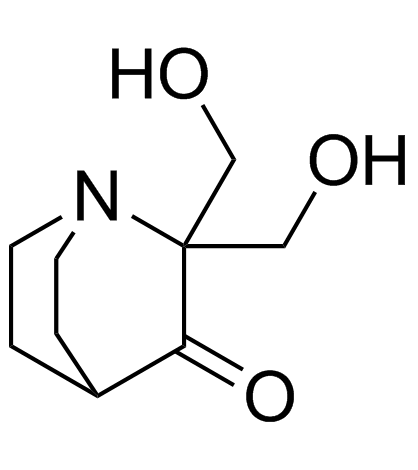PRIMA-1

PRIMA-1 structure
|
Common Name | PRIMA-1 | ||
|---|---|---|---|---|
| CAS Number | 5608-24-2 | Molecular Weight | 185.220 | |
| Density | 1.3±0.1 g/cm3 | Boiling Point | 353.7±17.0 °C at 760 mmHg | |
| Molecular Formula | C9H15NO3 | Melting Point | N/A | |
| MSDS | USA | Flash Point | 167.7±20.9 °C | |
| Symbol |


GHS07, GHS08 |
Signal Word | Danger | |
|
Ellipticine induces apoptosis in T-cell lymphoma via oxidative DNA damage.
Leuk. Lymphoma 56(3) , 739-47, (2015) The tumor suppressor p53 is often mutated in human cancers. Restoring its antitumor activity has been shown to be a promising therapeutic approach for cancer treatment. Here we analyzed the activity and mechanism of a p53 reactivator, ellipticine, in a cellul... |
|
|
3-BrPA eliminates human bladder cancer cells with highly oncogenic signatures via engagement of specific death programs and perturbation of multiple signaling and metabolic determinants.
Mol. Cancer 14 , 135, (2015) Urinary bladder cancer is one of the most fatal and expensive diseases of industrialized world. Despite the strenuous efforts, no seminal advances have been achieved for its clinical management. Given the importance of metabolic reprogramming in cancer cell s... |
|
|
The induction of the p53 tumor suppressor protein bridges the apoptotic and autophagic signaling pathways to regulate cell death in prostate cancer cells.
Oncotarget 5(21) , 10678-91, (2014) The p53 tumor suppressor protein plays a crucial role in influencing cell fate decisions in response to cellular stress. As p53 elicits cell cycle arrest, senescence or apoptosis, the integrity of the p53 pathway is considered a key determinant of anti-tumor ... |
|
|
Array-based genome-wide RNAi screening to identify shRNAs that enhance p53-related apoptosis in human cancer cells.
Oncotarget 5(17) , 7540-8, (2014) p53 transduction is a potentially effective cancer therapy but does not result in a good therapeutic response in all human cancers due to resistance to apoptosis. To discover factors that overcome resistance to p53-induced apoptosis, we attempted to identify ... |
|
|
Reactivation of wild-type and mutant p53 by tryptophanolderived oxazoloisoindolinone SLMP53-1, a novel anticancer small-molecule.
Oncotarget 7 , 4326-43, (2016) Restoration of the p53 pathway, namely by reactivation of mutant (mut) p53, represents a valuable anticancer strategy. Herein, we report the identification of the enantiopure tryptophanol-derived oxazoloisoindolinone SLMP53-1 as a novel reactivator of wild-ty... |